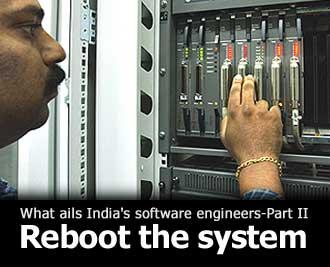
-- Microsoft Chief Technical Officer Craig Mundie
Mundie's bombshell, dropped during a recent India visit, blows our country's pride - at being an information technology knowledge goldmine -- to smithereens. But just why did Mundie say what he did? What ails our software engineer-developing engines? In a three-part special, we try to find answers. Here is the second instalment:
Part I: Techies, we have a problemBCA, MCA, BE/BTech in computer science, BE/BTech in information technology, BSc in computer science, MSc in computer science and integrated MSc in computer science/software engineering and MTech programmes.
These are the various engineering disciplines in computer science in India's engineering colleges.
In the 1980s, India had just 158 engineering colleges. That number has jumped to 1,208 in the last two decades, mainly because of the information technology boom and the ever-burgeoning capitation fee that self-financing colleges charge.
Every year, these engineering colleges admit about 350,000 students. Apart from this, nearly 3,500 students are absorbed into the seven premier Indian Institutes of Technology.
Experts say one of the biggest drawbacks of India's engineering education is overlapping. C R Muthukrishnan, department of computer science and engineering, IIT-Chennai, says the different programmes try to be everything to everyone.
"Today, MCA programmes are available, both, in engineering and arts & science colleges," he points out.
Experts also say the curriculum implementation of the degree programmes in computing tend to be poor across Indian engineering colleges.
For instance, degree programmes in computer science cover basics of computers, programming, software and topics such as databases, networks and software engineering in addition to electives. The curriculum is heavy with advanced courses and many students absorb and retain very little. The examinations are filled with questions that need long, descriptive answers. There are very few or no problem-solving, objective-type questions.
As a result, "we produce screwdriver technology engineers," says Bangalore-based IT consultant Vinod Abraham.
"The tragedy is that many of our engineers passing out of the prestigious institutes do not know anything about software programming."
Abraham, a computer engineer, says the biggest drawback of India's engineering colleges is the negligible infrastructure they possess. "There are no quality criteria in India's engineering colleges," he says.
Other experts point out that:
- Software programming courses in many engineering colleges are very lecture based, and students devote little time on learning the practical aspects of programming.
- Engineering students do not have adequate access to computers in most programming labs. They study nothing new, year after year, and fall back on the work of the previous batches instead of writing the programmes themselves.
- There is a severe shortage of competent faculty in computer science/IT in the Indian engineering institutes.
The government-appointed U R Rao Committee, which studied the problems affecting higher and technical education in India, said last year that to improve research and development, India needs well over 10,000 PhDs and twice as many MTech degree holders.
Currently, India produces barely 400 engineering PhDs per year, mostly from the Indian Institutes of Technology and the Indian Institute of Science in Bangalore, as opposed to 4,000 produced in the basic sciences.
'In India the overall quality of the educational system, apart from the top universities, could improve significantly,' said a recent McKinsey Global Institute study.
Improving the suitability of graduates is far from simple, but educational improvements can be coordinated closely with domestic and multinational companies to develop practical training in universities and external management training programmes, the Institute said.
'Study and work-abroad programs can help students gain international experience and create a worldwide diaspora of highly educated and globally minded workers,' the study pointed out.
Just what is the government doing to ensure quality control, you might ask.
Officials say the Indian government has set up various bodies such as the National Assessment and Accreditation Council, All India Council for Technical Education, Distance Education Council and the National Council of Teacher Education to ensure quality education, especially in the engineering and professional fields.
But a recent study by the Federation of Indian Chambers of Commerce and Industry said setting up so many agencies does not really ensure quality.
For instance, the National Assessment and Accreditation Council has accredited 2,088 colleges and 113 universities in just the 10 years it has existed.





